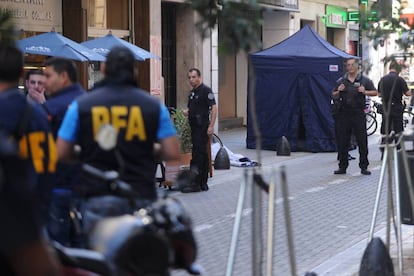Argentina adopts anti-immigrant rhetoric over public safety fears
Macri administration pledges to stop foreigners with criminal records from entering the country

Argentina was born as a land open to immigrants coming from all corners of the planet. The 1853 Constitution made it quite clear in its preamble, where it explained its own main goal: “To secure the blessings of liberty to ourselves, to our posterity, and to all men of the world who wish to dwell on Argentinean soil.”

Even today, Argentina remains one of the most open countries in the world, and South America’s biggest recipient of foreigners. The laws help: free universal education and healthcare, and open-border policies.
But even Argentina is starting to change.
In an election year, and with fear of a lack of public safety gripping society, the Mauricio Macri administration has found a culprit: foreigners.
The executive has promised more checks at the borders and on airplanes to ensure that individuals with a criminal record are not allowed into the country. It is also pledging to speed up the deportation of criminals.
Citizens from Peru and Paraguay are coming here and they end up killing one another over control of the drug trade
Security Minister Patricia Bullrich
The government insists that it is not trying to stigmatize immigrants, or to blame them for all crimes. It notes that last year, with Macri already in office, 215,000 people became naturalized citizens. And Argentina is going to accept Syrian refugees at a time when many other countries are turning them away.
“We are not like Donald Trump, we have the opposite idea, Argentina is an open country,” said Macri’s deputy, Gabriela Michetti.
But several organizations and opposition groups are raising the alarm.
Argentina’s foreign population is 4.5%, and foreign inmates serving time represent 6% of the prison population. The figures do not look alarming. Yet the government is providing another set of data that focuses on federal penitentiaries, and points to foreigners as being responsible for the most serious crimes, particularly drug trafficking.

“The foreign national population in the custody of the Federal Penitentiary Service has grown over the last years to reach 21.35% of the total prison population in 2016. In crimes linked to drugs, 33% of the people in the custody of the Federal Penitentiary Service are foreigners.”
The political message is very clear.
“Citizens from Peru and Paraguay are coming here and they end up killing one another over control of the drug trade. Many Paraguayans, Bolivians and Peruvians are involved, either providing the capital or as drug mules, as drivers or as part of a chain,” said Security Minister Patricia Bullrich. Her words have triggered protests from several of those countries.
And yet the perpetrators of the last crimes to shock society were all born in Argentina.
This kind of reaction is nothing new. Past leaders have frequently resorted to the immigration theory to explain away crime rates. In October 2014, Cristina Fernández de Kirchner also stated that “foreigners who are caught committing a crime will be deported, and not allowed to come back for the next 15 years.”
“Where do Argentineans come from? They are descended from boats”
Nothing came of it. Then as now, political pledges to toughen up the law are always well received by a skittish population, but the real effects are typically very limited.
Experts insist that a lack of security has much deeper causes that have to do with poverty and inequality.
And the culture of immigration is engraved in every name and every family history here. “Where do Argentineans come from?” goes one popular joke in Buenos Aires. “They are descended from boats.”
Even President Macri is the son of an Italian national who arrived in Buenos Aires at the age of 18 and built an empire from the ground up.
But Argentina is going through difficult times, and many citizens are taking the easy way out: blame the immigrants. Society is in a state of permanent alert, particularly in the suburbs of large cities such as Buenos Aires, Rosario or Córdoba. Five television channels broadcasting news 24/7 provide detailed information about the most shocking crimes, ranging from theft to murder: a 15-year-old who killed a 14-year-old, a pregnant 15-year-old shot by two teens.
Ever since the 2001 crisis, Argentina has slowly become more similar to its neighbors. While homicide rates are still low at six for every 100,000 inhabitants (compared with 84 in Honduras, 53 in Venezuela and 31 in Colombia), people compare themselves not to other countries, but to Argentina 20 years ago. And the sense of fear is extending.
The middle and upper classes have reacted by hiring security guards or moving to closed communities
“Only six years ago, it was possible to go out on the lane to sip mate. Now this is pure hell,” says Micaela, 22, speaking in La Tablada, the most dangerous area of Rosario.
The scariest part is that this is a relatively new trend. The middle and upper classes have reacted by hiring security guards or moving to closed communities surrounded by barbed wire and electric fencing. All visitors get their vehicles searched, including the trunk. And workers’ bags are inspected to make sure that they have not stolen anything during their shift.
The poor, who live in neighborhoods where the worst crimes take place, react desperately by stocking up on weapons. And the urban middle class, which is Macri’s natural voter pool, is demanding action now.
When the president periodically visits a neighborhood and starts ringing doorbells – a method invented by his Ecuadorean guru Jaime Durán Barba – the locals speak almost exclusively about the lack of security. The real facts are heightened by a sense of general fears over public safety fueled by media outlets that have made this issue their number-one priority.
Each new crime has a multiplying effect. Macri, just like the Kirchners before him, has increased the number of police officers on patrol. But that was not enough. He fought against corruption. But that was not enough, either. And so, with a new election looming, the president has turned to his last-resort solution: the outside enemy. The campaign is certain to be long and complicated.
English version by Susana Urra.
Tu suscripción se está usando en otro dispositivo
¿Quieres añadir otro usuario a tu suscripción?
Si continúas leyendo en este dispositivo, no se podrá leer en el otro.
FlechaTu suscripción se está usando en otro dispositivo y solo puedes acceder a EL PAÍS desde un dispositivo a la vez.
Si quieres compartir tu cuenta, cambia tu suscripción a la modalidad Premium, así podrás añadir otro usuario. Cada uno accederá con su propia cuenta de email, lo que os permitirá personalizar vuestra experiencia en EL PAÍS.
¿Tienes una suscripción de empresa? Accede aquí para contratar más cuentas.
En el caso de no saber quién está usando tu cuenta, te recomendamos cambiar tu contraseña aquí.
Si decides continuar compartiendo tu cuenta, este mensaje se mostrará en tu dispositivo y en el de la otra persona que está usando tu cuenta de forma indefinida, afectando a tu experiencia de lectura. Puedes consultar aquí los términos y condiciones de la suscripción digital.








































